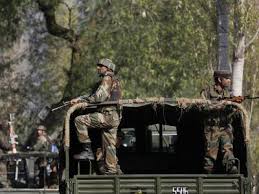 India does not have too many good options in responding to the militant raid that killed 17 Indian army personnel, perhaps the largest number ever for a single day of the Kashmiri insurgency that began in 1990.
India does not have too many good options in responding to the militant raid that killed 17 Indian army personnel, perhaps the largest number ever for a single day of the Kashmiri insurgency that began in 1990.
Sure, you can break down the responses and see what works. First the military — an army raid across the Line of Control, an army incursion across the international border with Pakistan, a naval blockade of Karachi, an air strike on the Jaish headquarters in Bahawalpur, an air strike on camps in Pakistan-occupied Kashmir. Second, the diplomatic — a UN Security Council condemnation and sanctions, sanctions by friendly countries like the US, Japan, UK and Germany, and a few Gulf countries. All of the above have been thought about and have not got us anywhere.
At the end of the day, India has to ensure that the options it exercises — particularly the military ones — do not leave it worse off than before in terms of casualties and costs.
Proponents of the military strategy must also be aware of the fact that the Indian armed forces are not in particularly good shape for an all out war with Pakistan. The military is short of vital equipment like artillery and air-defence systems, as well as key ammunition. The air force is also not in particularly great form given the steady attrition it has faced without getting adequate replacements.
For a government which came to power promising a change in the allegedly weak-kneed policies of the past, there are powerful psychological and political compulsions at play here. The BJP-led regime demonstrated what it meant by undertaking a campaign of disproportionate bombardment of the international border in Jammu in early 2014. After the Pathankot attack, it took on a high-decibel diplomatic campaign to isolate and sanction Islamabad and then, it threatened Pakistan that it would expand its political support to separatists in Gilgit-Baltistan and Balochistan.
The violent mass protest in Kashmir upended a lot of calculations. But New Delhi’s poor handling of the events, especially by denigrating the protests as being inspired by and paid for by Pakistan only served to aid the Pakistani design. The attack in Uri is now a Pakistani riposte, aimed as much at New Delhi as at the disaffected Kashmiri. To New Delhi, the message is that when push comes to shove, Islamabad has the wherewithal to do things, while the signal to the Kashmiris is that Pakistan remains a tried and tested ally in their struggle. Of course, you can be sure that the long-suffering Kashmiris will not be particularly inspired by the Uri attack, knowing that they are the ones who will suffer the consequences, not the Pakistanis.
The downside of force
The danger of army action across the international border is that if it is too successful, it could trigger a nuclear war. And action limited to PoK presents military difficulties because of the terrain, and also may not be sufficient to compel the Pakistanis to shut down their jihad factory.
Air strikes are a tempting option; however, India lacks the intelligence and surveillance capabilities that will ensure the targets struck are actually militant camps. The possibility of collateral deaths is high and could result in a PR setback for India should a large number of women and children be killed.
Precision strikes are a myth of sorts and the kind of strikes that Israel and the US have launched, with vastly superior intelligence and targeting capabilities, have resulted in a large number of civilian deaths which have not had the effect of cowing down the populace, either in Gaza or Afghanistan.
Air strikes in the Pakistani heartland such as Muridke or Bahawalpur will be contested by the Pakistan Air Force and will almost certainly trigger a response whose consequences cannot be easily determined.
Another possibility is a large-scale covert campaign targeting Pakistani terrorists and their facilities. But as is well known, India lacks the wherewithal and would require several years of preparation to run such operations. Nevertheless, Pakistan believes that India is now on the path towards stepping up covert activities in Balochistan and Gilgit-Baltistan and it may be useful to keep on deepening the Pakistani neuroses here as a bargaining chip to get it to shut down its jihadi shop. Modi may actually be on the right track here, as long as he can finesse it.
Actually, the only way to deal with the dilemma confronting the country is to persist in a combination of policies.
First, harden the defensive system against infiltration and perimeter security in camps. In Pathankot and again in Uri, we have seen the perimeter breached too easily.
Second, strengthen covert capabilities in Balochistan and Gilgit Baltistan, not with the view of hiving them off Pakistan, but for the purpose of exerting pressure on the Pakistan military brass in Rawalpindi.
Third, step up the diplomatic offensive against Pakistan, and put serious pressure on countries like the US and its allies as well as institutions like the IMF to act against Islamabad. UN resolution 1373 passed in the wake of 9/11 has been adopted under Chapter VII of the UN Charter and India should lobby with UN members for its application to Pakistan since it obligates states “to prevent the commission of terrorist acts” as well as to “deny safe haven to those who finance, plan, support or commit terrorist acts, or provide safe havens.” Of course, we need to understand that given the respective compulsions of states like the US and China, none of these diplomatic steps will yield results.
The eventual goal has to be for New Delhi to bilaterally bring Islamabad around to rejecting the instrument of terrorism. This is not an impossible goal as was evident in the Vajpayee and Manmohan eras. The ceasefire of 2003 and the subsequent back channel discussions led to a sharp reduction of infiltration and violence in the Kashmir Valley. Indeed, we also came close to working out a modus vivendi in Jammu and Kashmir with Pakistan during this period.
Some of the suggestions above can be seen in the Modi approach to Pakistan. But there is too much incoherence and rhetoric, which tends to confuse both adversaries and citizens. Modi needs to get away from using Jammu and Kashmir as part of his domestic electioneering and treat the issue with the seriousness it deserves.
Courtesy: ORF
Author Profile
- India Writes Network (www.indiawrites.org) is an emerging think tank and a media-publishing company focused on international affairs & the India Story. Centre for Global India Insights is the research arm of India Writes Network. To subscribe to India and the World, write to editor@indiawrites.org. A venture of TGII Media Private Limited, a leading media, publishing and consultancy company, IWN has carved a niche for balanced and exhaustive reporting and analysis of international affairs. Eminent personalities, politicians, diplomats, authors, strategy gurus and news-makers have contributed to India Writes Network, as also “India and the World,” a magazine focused on global affairs.
Latest entries
 In ConversationJuly 26, 2024India-Italy defence collaboration can extend to third countries: Anil Wadhwa
In ConversationJuly 26, 2024India-Italy defence collaboration can extend to third countries: Anil Wadhwa In ConversationJuly 23, 2024Italy views India as a key partner in Indo-Pacific: Vani Rao
In ConversationJuly 23, 2024Italy views India as a key partner in Indo-Pacific: Vani Rao DiplomacyJune 29, 2024First BRICS unveils a roadmap for boosting tourism among emerging economies
DiplomacyJune 29, 2024First BRICS unveils a roadmap for boosting tourism among emerging economies India and the WorldJune 11, 2024On Day 1, Jaishankar focuses on resolving standoff with China
India and the WorldJune 11, 2024On Day 1, Jaishankar focuses on resolving standoff with China






